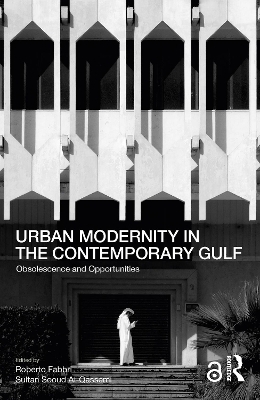
Urban Modernity in the Contemporary Gulf
Routledge (Verlag)
978-0-367-74192-1 (ISBN)
Urban Modernity in the Contemporary Gulf offers a timely and engaging discussion on architectural production in the modernization era in the Arabian Peninsula. Focusing on the 20th century as a starting point, the book explores the display of transnational architectural practices resulting in different notions of locality, cosmopolitanism, and modernity. Contextually, with an eye on the present, the book reflects on the initiatives that recently re-engaged with the once ville moderne which, meanwhile, lost its pivotal function and meaning.
A city within a bigger city, the urban fabric produced during the modernization era has the potential to narrate the social growth, East–West dynamics, and citizens’ memories of the recent past. Reading obsolescence as an opportunity, the book looks into this topic from a cross-country perspective. It maps, reads and analyses the notion of modern heritage in relation to the contemporary city and looks beyond physical transformations to embrace cultural practices and strategies of urban re-appropriation. It interrogates the value of modern architecture in the non-West, examining how academic research is expanding the debate on Gulf urbanism, and describes how practices of reuse could foster rethinking neglected areas, also addressing land consumption in the GCC.
Presenting a diverse and geographically inclusive authorship, which combines established and up-and-coming researchers in the field, this is an important reference for academics and upper-level students interested in heritage studies, post-colonial urbanism, and architecture in the non-West.
The Open Access version of this book, available at www.taylorfrancis.com, has been made available under a Creative Commons Attribution-Non Commercial-No Derivatives 4.0 license.
Sultan Sooud Al-Qassemi is a columnist and researcher on social, political, and cultural affairs in the Arab Gulf states. Al-Qassemi is also founder of the Barjeel Art Foundation in Sharjah, UAE. He was an MIT Media Lab Director’s Fellow from 2014 to 2016, a practitioner-in-residence at the Hagop Kevorkian Center for Near Eastern Studies at New York University in spring 2017 and a Yale Greenberg World Fellow in 2018. Al-Qassemi was a visiting instructor at the Council of Middle East Studies at Yale University, the Center of Contemporary Arab Studies at Georgetown University, the American University of Paris, the Islamic Civilization and Societies programme at Boston College and the School of Public Affairs at SciencesPo, Paris. In the Fall 2021 Al-Qassemi was appointed as Kuwait Foundation Visiting Scholar, Middle East Initiative at the Harvard Kennedy School and Lecturer, School of Arts and Sciences, Brandeis University. Al-Qassemi, along with Todd Reisz, is co-editor of Building Sharjah (Birkhauser, 2021). Roberto Fabbri is an architect, researcher, and associate professor at Zayed University, UAE. From 2016 to 2021 he taught at the University of Monterrey, Mexico, and previously at the University of Bologna, Italy, and the American University of Kuwait. As a consultant of the United Nations Development Programme, Roberto participated in the rehabilitation of Kuwait National Museum and completed the transformation of the American Missionary Hospital of Kuwait into cultural hub. He regularly participates in international conferences, recently at Yale, Cambridge, King’s College London, and INHA-Paris, and has published extensively in academic journals, such as Domus; Faces, journal d’architecture; and International Journal of Islamic Architecture. He has published two books on the architectural works of Max Bill (Mondadori 2011, inFolio 2017) and co-authored the double-volume, Modern Architecture Kuwait 1949–89 (Niggli 2016, 2017).
Kishwar Rizvi PREFACE: Forms of Engagement: Architectural Modernism and Heritage in the Arab Gulf States Roberto Fabbri, Sultan Sooud Al Qassemi INTRODUCTION: Re-engaging the Modern PART I: RETRACING MODERNITIES Mohamed Elshahed UDO KULTERMANN’S HISTORY OF ARAB CONTEMPORARY ARCHITECTURE Todd Reisz GARDENS AND GENERATORS: Demarcating Dubai’s Modernization Roberto Fabbri FRAGMENTARIUM: Episodes of Modernity in the Contemporary Kuwait City Jason Carlow INDUSTRIAL PROMISES: Speculative Thinking for Sharjah’s Industrial Districts PART II: TRAJECTORIES OF GLOBAL PRACTICES Michael Kubo BUILDING IDENTITY: Transnational Exchange and the Authorship of Modern Gulf Heritage Kevin Mitchell CHANGING FACADES IN GULF CITIES: Identity, Icons, and Lamentations of Loss Jumanah Abbas THE CORNICHE: The Representation of Doha’s Waterfront and its Institutional Buildings Faisal Almogren OPERATIONAL PLANNING: An Alternative View of Doxiadis’ Project in Riyadh Edward Nilsson HISTORY, MEMORY, AND NARRATIVES OF THE PAST AND FUTURE: The New Souks in Kuwait PART III: HERITAGE AND THE MODERN Asseel Al-Ragam INTERSECTIONS BETWEEN THE PUBLIC AND PRIVATE SPHERES OF CULTURE: Modern Heritage Practices in Kuwait Suha Hasan A[N] ABSENT SPACE: 1355 Trinidad Rico MODERNISM IN QATAR: Survival through Reuse Marco Sosa, Lina Ahmad URBAN PORTRAITS: Preserving the Memory of Modern Architectural Heritage in the United Arab Emirates Sultan Sooud Al Qassemi CONCLUSIONS: Modernism’s Back and Forth INDEX
| Erscheinungsdatum | 30.09.2021 |
|---|---|
| Zusatzinfo | 6 Line drawings, black and white; 58 Halftones, black and white; 64 Illustrations, black and white |
| Verlagsort | London |
| Sprache | englisch |
| Maße | 156 x 234 mm |
| Gewicht | 594 g |
| Themenwelt | Geisteswissenschaften ► Geschichte ► Regional- / Ländergeschichte |
| Naturwissenschaften ► Geowissenschaften ► Geografie / Kartografie | |
| Sozialwissenschaften ► Soziologie ► Spezielle Soziologien | |
| Technik ► Architektur | |
| ISBN-10 | 0-367-74192-X / 036774192X |
| ISBN-13 | 978-0-367-74192-1 / 9780367741921 |
| Zustand | Neuware |
| Informationen gemäß Produktsicherheitsverordnung (GPSR) | |
| Haben Sie eine Frage zum Produkt? |
aus dem Bereich


